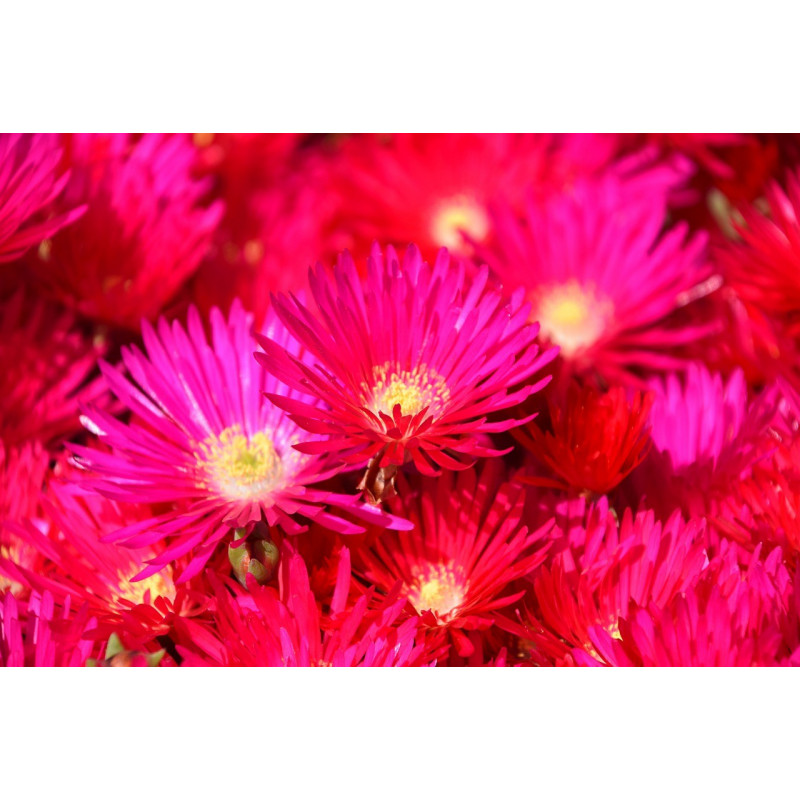



ICEPLANT
Mesembryanthemum crystallinum
Iceplant is an edible succulent type of plant that is often grown as an ornamental. The leaves are edible and are covered with shiny globules which have a delicious lemony flavour. The seeds are also edible and are reputed to have some medicinal properties. Iceplant is found in Japanese supermarkets where it is eaten raw, in salads, or used with dips. A soap substitute can be obtained by crushing the leaves and using them to wash ones hands clean. This plant grows in a wide range of soil and is tolerant of both acidic and salty soils. It makes a lovely ornamental groundcover and can be used for bio-remediation work. It grows to 1m wide and reaches heights of 30-40cm. The insect pollinated flowers open in the morning and close up at night. Sow the seeds in autumn about 1 cm deep do not overwater them. The plants will flower in spring and summer and often die out after flowering. They can become perrenial, in some areas, if the flowers are deadheaded and conditions are favourable.
QTY 100 seeds
Image by Deborah Windham from Pixabay
 Security policy
Security policy
The site is checked on a regular basis
 Delivery policy
Delivery policy
Seeds are sent within 2 business days of payment receipt,parcels include tracking
 Return policy
Return policy
Items can be returned within 7 days of receipt provided they are in as received condition
ICEPLANT
Mesembryanthemum crystallinum
Iceplant is an edible succulent type of plant that is often grown as an ornamental. The leaves are edible and are covered with shiny globules which have a delicious lemony flavour. The seeds are also edible and are reputed to have some medicinal properties. Iceplant is found in Japanese supermarkets where it is eaten raw, in salads, or used with dips. A soap substitute can be obtained by crushing the leaves and using them to wash ones hands clean. This plant grows in a wide range of soil and is tolerant of both acidic and salty soils. It makes a lovely ornamental groundcover and can be used for bio-remediation work. It grows to 1m wide and reaches heights of 30-40cm. The insect pollinated flowers open in the morning and close up at night. Sow the seeds in autumn about 1 cm deep do not overwater them. The plants will flower in spring and summer and often die out after flowering. They can become perrenial, in some areas, if the flowers are deadheaded and conditions are favourable.
QTY 100 seeds
Image by Deborah Windham from Pixabay

ICEPLANT
Mesembryanthemum crystallinum
Iceplant is an edible succulent type of plant that is often grown as an ornamental. The leaves are edible and are covered with shiny globules which have a delicious lemony flavour. The seeds are also edible and are reputed to have some medicinal properties. Iceplant is found in Japanese supermarkets where it is eaten raw, in salads, or used with dips. A soap substitute can be obtained by crushing the leaves and using them to wash ones hands clean. This plant grows in a wide range of soil and is tolerant of both acidic and salty soils. It makes a lovely ornamental groundcover and can be used for bio-remediation work. It grows to 1m wide and reaches heights of 30-40cm. The insect pollinated flowers open in the morning and close up at night. Sow the seeds in autumn about 1 cm deep do not overwater them. The plants will flower in spring and summer and often die out after flowering. They can become perrenial, in some areas, if the flowers are deadheaded and conditions are favourable.
QTY 100 seeds
Image by Deborah Windham from Pixabay